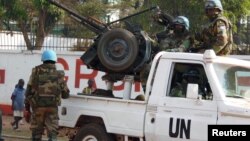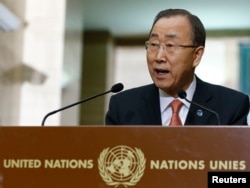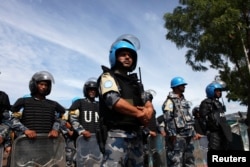United Nations Secretary General Ban Ki-moon said Thursday that “decisive and bold action” is required to end sexual abuse and exploitation by U.N. peacekeepers.
Speaking to the 15-nation U.N. Security Council, Ban said such abuse — 69 allegations last year alone — undermines the trust between the U.N. and the people it is sent to protect.
"It ... betrays the values and principles that the U.N. purports to advance, and tarnishes the credibility of United Nations peacekeeping operations and the United Nations as a whole,” Ban said.
The U.N. mission in the Central African Republic, MINUSCA, has been the subject of the most allegations of sexual abuse and exploitation — 22 last year and several more in 2016.
The U.N. chief has pursued a “zero tolerance” policy against such crimes for several years, but cases have continued to rise.
In a report last month on the subject, the secretary-general proposed new initiatives to strengthen the U.N.’s response, including to help end impunity, assist victims and improve accountability for perpetrators.
The secretary-general has asked countries providing troops and police to conduct courts-martial at the missions where the abuse is alleged to have occurred, and he has called for the collection of DNA samples from alleged perpetrators.
Ban has also recommended that investigations into allegations be concluded within three to six months. And he has called for the salaries of peacekeepers, in cases where allegations are substantiated, to be transferred to a trust fund to compensate victims.
In situations where multiple members of the same contingent have been accused of sexual abuse or exploitation, the entire unit could be repatriated. This has already occurred, with a contingent from the Democratic Republic of Congo being sent home last month from the Central African Republic mission.
Council action
The United States has drafted a resolution that endorses the secretary-general's recommendations. After several negotiating sessions with council members, a vote is expected Friday afternoon.
Russia’s deputy ambassador, Petr Iliichev, told council members that “the draft is far from ideal,” and that Moscow would prefer it be broader and include U.N. civilian staff as well as foreign troops that are sometimes deployed under U.N. mandates but not as part of U.N. peacekeeping missions.
A total of 30 allegations of sexual abuse and exploitation were made against civilian U.N. personnel in 2015.
The Russian and Egyptian envoys also said existing committees in the General Assembly that deal with conduct and disciplinary issues in peacekeeping missions should take up the issue, not the Security Council.
But U.S. Ambassador Samantha Power strongly disagreed, saying the Security Council, which has responsibility for all aspects of authorizing and mandating peacekeeping operations, must address the issue of abuse and exploitation. She also chided the General Assembly for not taking more “constructive action” and “aggressive steps” to curb the problem.
Egyptian Ambassador Amr Aboulatta also expressed concern about efforts to repatriate entire contingents where some members are accused, calling it “collective punishment.”
“Accountability must be confined to those involved in the crimes, and not the others,” he said.












